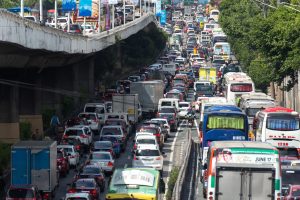The Philippine government has set up an independent panel to probe large-scale corruption related to the government’s infrastructure projects.
Earlier this week, President Ferdinand Marcos Jr. announced the establishment of the Independent Commission for Infrastructure (ICI), which he has “mandated to investigate alleged corruption, irregularities, and misuse of funds in government flood control and related projects within the last 10 years.” This covers not just his term as president, which started in 2022, but also the previous Duterte and Aquino administrations.
The ICI has been highly anticipated since there is deep distrust that Congress can handle a credible anti-corruption investigation involving public works of contractors linked to legislators.
This is the latest initiative of Marcos aimed at combating entrenched corruption in the bureaucracy. During his state of the nation address in July, he blamed corruption for substandard flood control projects. He subsequently launched a website encouraging people to file reports on corruption-tainted projects. His office said more than 12,000 complaints had been lodged by ordinary citizens over the past month.
Aside from inspecting and exposing faulty infrastructure projects across the country, Marcos also unveiled a list of companies that bagged the biggest flood control contracts under his administration.
This list became an initial reference for journalists, analysts, and scholars wishing to dig deeper into the web of corruption surrounding the flood control projects. It revealed contractors who donated campaign funds to politicians, the companies implicated in non-existent projects, and those owned by relatives of top bureaucrats and even members of Congress. Soon, internet users exposed the “nepo babies” or the children of big-time contractors and politicians who flaunt their luxurious lifestyles on social media.
Public uproar became palpable as evidence of corruption in government projects implicated legislators, including allies and some Cabinet members of the president.
Aside from the resignation of several top officials of the Department of Public Works and Highways (DPWH), the corruption scandal also hounded both Houses of Congress.
A Senate committee held a public hearing, which featured a contractor who testified that DPWH officials and several members of the House of Representatives received kickbacks from infrastructure projects. Before stepping down from his position, the Senate President said in a speech that among his accomplishments was the naming of the House Speaker in the anti-corruption hearing.
Meanwhile, the House of Representatives conducted its own hearing, which featured testimonies from former DPWH officials who named two senators involved in corruption deals. The hearing also confirmed that billions of pesos were allocated for flood control in a single district in Davao, the hometown of former President Rodrigo Duterte.
President Marcos’ anti-corruption drive has led to his allies hurling accusations against each other about who got more entitlements and insertions in the national budget.
It seems the president’s unity government, which clinched a landslide victory in 2022, was undermined not just by internal power struggles but also by a vicious scramble for funds and infrastructure projects.
The vice president was impeached by the House of Representatives because of her alleged misuse of confidential funds. The former Senate President has called for a probe into the role of the House Speaker in the flood control corruption scandal, and members of the House of Representatives are implicating several senators for receiving bribes from contractors.
Those who hold top positions in the bureaucracy are directly or indirectly linked to the latest corruption issue. Even President Marcos cannot distance himself from the controversy since he drafted, signed, and implemented the budget law. He approved the rollout of pork barrel projects which benefited his allies, he allowed congressional insertions in the budget program, and his office has supervision over the DPWH’s infrastructure projects. His stern response amid the raging corruption issue has also failed to convince transparency stakeholders since he is often caricatured as the original “nepo baby,” given that his father was president during the Martial Law era.
The establishment of the ICI seeks to assure the public that the government is determined to root out corruption and pursue accountability. The challenge is to persuade public opinion that the ICI will be able to effectively fulfill its mission in contrast to the ongoing probe of Congress, which suffers from the impression that legislators are only concerned about protecting their interests and covering up their crimes.
The release of photos showing piles of cash intended for public officials has further aroused anger among the public in recent days.
As legislators continue to conduct so-called anti-corruption hearings and the ICI has yet to start its work, the public is demanding more than just “performative” justice. As the nation marks the Martial Law anniversary on September 21, various protests scheduled for this day will highlight how plunder and abuse of power during the dictatorship continue to plague the nation.

































